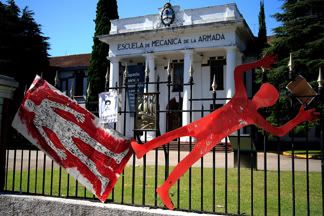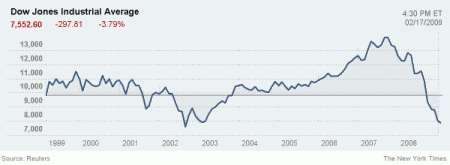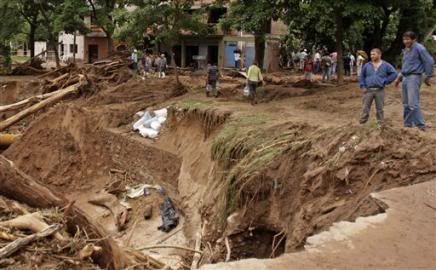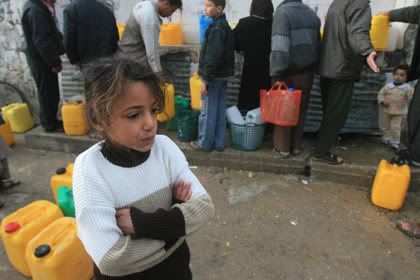this is critical to a fuller understanding of just exactly what the hell is going on with these so-called "bailouts"...
courtesy of information clearing house...High Noon: Geithner v. The American Oligarchs
Bill Moyers interviews former chief economist of the International Monetary Fund (IMF), MIT Sloan School of Management professor and senior fellow at the Peterson Institute for International Economics, Simon Johnson examines President Obama's plan for economic recovery.
BILL MOYERS: The battle is joined as they say — and here's the headline that framed it: "High Noon: Geithner v. The American Oligarchs." The headline is in one of the most informative new sites in the blogosphere called: www.baselinescenario.com . Here's the quote that grabbed me:
"There comes a time in every economic crisis, or more specifically, in every struggle to recover from a crisis, when someone steps up to the podium to promise the policies that — they say — will deliver you back to growth. The person has political support, a strong track record, and every incentive to enter the history books. But one nagging question remains. Can this person, your new economic strategist, really break with the vested elites that got you into this much trouble?"
And here's the man who asked that question. Simon Johnson is former chief economist at the International Monetary Fund. He now teaches global economics and management at MIT's Sloan School of Management and is a senior fellow of the Peterson Institute. He is co-founder of that website I quoted — baselinescenario.com — where he analyzes the global economic and financial crisis.
Welcome, Simon Johnson to the Journal.
SIMON JOHNSON: Nice to be here.
BILL MOYERS: What are you signaling with that headline, "Geithner vs. the American Oligarchs"?
SIMON JOHNSON: I think I'm signaling something a little bit shocking to Americans, and to myself, actually. Which is the situation we find ourselves in at this moment, this week, is very strongly reminiscent of the situations we've seen many times in other places.
But they're places we don't like to think of ourselves as being similar to. They're emerging markets. It's Russia or Indonesia or a Thailand type situation, or Korea. That's not comfortable. America is different. America is special. America is rich. And, yet, we've somehow find ourselves in the grip of the same sort of crisis and the same sort of oligarchs.
BILL MOYERS: Oligarchy is an un-American term, as you know. It means a government by a small number of people. We don't like to think of ourselves that way.
SIMON JOHNSON: It's a way of governing. As you said. It comes from, you know, a system they tried out in Greece and Athens from time to time. And it was actually an antithesis to democracy in that context.
But, exactly what you said, it's a small group with a lot of power. A lot of wealth. They don't necessarily - they're not necessarily always the names, the household names that spring to mind, in this kind of context. But they are the people who could pull the strings. Who have the influence. Who call the shots.
BILL MOYERS: Are you saying that the banking industry trumps the president, the Congress and the American government when it comes to this issue so crucial to the survival of American democracy?
SIMON JOHNSON: I don't know. I hope they don't trump it. But the signs that I see this week, the body language, the words, the op-eds, the testimony, the way they're treated by certain Congressional committees, it makes me feel very worried.
I have this feeling in my stomach that I felt in other countries, much poorer countries, countries that were headed into really difficult economic situation. When there's a small group of people who got you into a disaster, and who were still powerful. Disaster even made them more powerful. And you know you need to come in and break that power. And you can't. You're stuck.
BILL MOYERS: Both the "Wall Street Journal" and "The New York Times" reported this week that Obama's top two political aides, Rahm Emanuel and David Axelrod, have pushed for tougher action against the banks. But they didn't prevail. Obama apparently sided with Geithner and the Treasury Department in using a velvet glove.
SIMON JOHNSON: What I read from that is that there is an unnecessary and excessive deference to the experts, or the supposed experts.
And I think the view that a lot of people have in Washington - I live in Washington, I follow this very closely - the view is that you need to rely on the technocrats. And the technocrats are saying, "This is the way to go, and you mustn't be too tough on because banks, because that will have adverse consequences for credits, and for the economy, and for unemployment," and so on and so forth. Those technocrats, if that's what they're saying, are wrong. That is not the right way to deal with this crisis.
There are many find professionals at Treasury with great experience, who have spent their lives working on important issues related to the United States. What we face right now is not a typical U.S. issue. We face a crisis, and the president said this on Monday night, the president said, President Obama said, "We've never seen anything like this since the Great Depression."
Therefore, nobody working now, you know, has any firsthand experience. And he also said, "We may face what we call a lost decade." We've never seen that anywhere other than Japan in the 1990s, right?
And something for Treasury officials to really understand, and to really understand the alternatives - they're not, I mean, with all due respect to them, they're not the ultimate authority. I don't think they're the right people.
The correct people you should be asking this question to are people at the IMF. And I can tell you what they're saying is the policy that we seem to be perusing, of being nice to the banks, is a mistake. The powerful people are the insiders. They're the CEOs of these banks. They're the people who run these banks. They're the people who pay themselves the massive bonuses at the end of the last year. Now, those bonuses are not the essence of the problem, but they are a symptom of an arrogance, and a feeling of invincibility, that tells you a lot about the culture of those organizations, and the attitudes of the people who lead them.
BILL MOYERS: Geithner has hired as his chief-of-staff, the lobbyist from Goldman Sachs. The new deputy secretary of state was, until last year, a CEO of Citigroup. Another CFO from Citigroup is now assistant to the president, and deputy national security advisor for International Economic Affairs. And one of his deputies also came from Citigroup. One new member of the president's Economic Recovery Advisory Board comes from UBS, which is being investigated for helping rich clients evade taxes.
You're probably too young to remember that old song, "Sounds like the Mack the Knife is back in town." I mean, is that what you're talking about with this web of relationships?
SIMON JOHNSON: Absolutely. I don't think you have enough time on your show to go through the full list of people and all the positions they've taken. I'm sure these are good people. Don't get me wrong. These are find upstanding citizens who have a certain perspective, and a certain kind of interest, and they see the world a certain way.
And it's exactly a web of interest, I think, is what you said. And that's exactly the right way to think about it. That web of interest is not my interest, or your interest, or the interest of the taxpayer. It's the interest, first and foremost, of the financial industry in this country.
BILL MOYERS: Do you think that Obama understands how these guys play the game? Let me play you the recording of a conference call "Huffington Post" released this week. One of the top officials of Morgan Stanley is speaking to his colleagues. Here it is.
JAMES GORMAN: I'm going to turn to a topic that I suspect is near and dear to everybody's hearts, which is retention. There will be a retention award. Please do not call it a bonus, it is not a bonus it is an award. The award will be based on '08 full year production. Clearly it would have been cheaper to do it off '09 but we think it's the right thing to do and we've made that decision.
SIMON JOHNSON: What he's basically saying is business as usual. Go about your daily lives. Get the bonuses. Re-brand them as awards. But it really shows you the arrogance, and I think these people think that they've won. They think it's over. They think it's won. They think that we're going to pay out ten or 20 percent of GDP to basically make them whole. It's astonishing.
BILL MOYERS: Why wouldn't they believe that? I mean, when I watched the eight CEOs testify before Congress at the House Financial Services Committee earlier this week, I had just finished reading a report that almost every member of that Committee had received contributions from those banks last year. I mean in a way that's like paying the cop on the beat not to arrest you, right?
SIMON JOHNSON: I called up one of my friends on Capitol Hill after that testimony, and that session. I said, "What happened? This was your moment. Why did they pull their punches like that?" And my friend said, "They, the Committee members, know the bankers too well."
BILL MOYERS: Last year, the securities and investment industry made $146 million in campaign contributions. Commercial banks, another $34 million. I mean, American taxpayers don't have a flea's chance on a dog like that, do they?
SIMON JOHNSON: It a massive problem, obviously. And I do think, though, the good news there are people in the White House - I think the president himself, is aware of this broader issue. And, obviously, the campaign, the Obama campaign was very good at getting small contributions, and trying to minimize the impact of major donors like that.
But, at the same time, these people are throughout the system of government. They are very much at the forefront of the Treasury. The Treasury is apparently calling the shots on their economic policies. This is a decisive moment. Either you break the power or we're stuck for a long time with this arrangement.
BILL MOYERS: When Tim Geithner said, earlier in the week, that the American people have lost faith in some financial institutions and the government, did it occur to you that this was the same man who was president of the New York Fed through much of this debacle?
SIMON JOHNSON: I have no problem with poachers turning gamekeeper, right? So if you know where the bodies are buried maybe you can help us sort out the problem. And I did think the first three or four minutes of what Mr. Geithner said were very good.
As a definition of a problem, and pointing the finger clearly at the bankers, and saying that the government had been slow to react, and, of course, that included himself. I liked that. And then he started to talk about the specifics. And he said, "The compensation caps we've put in place, for the executives of these banks, are strong." And at that point I just fell out of my chair. That is not true. That is factually inaccurate, in my opinion.
BILL MOYERS: That?
SIMON JOHNSON: That this $500,000 limit, and deferred stock, is some kind of restriction on what they do? It's deferred stock, Bill. It's not restricted. You can get as much stock as you want, as soon as you pay back the government, you can cash out of that. That's one.
Second, you can, sorry to get technical, but reset the strike price. This is something you and your and your viewers, you need to hear this one out. Just look for these words, okay, follow them through the press. When you get into trouble, when your company goes down, and you have massive amounts of stock options that aren't worth much anymore, because the stock price has gone down, you say, "Oh, well, we're going to reset our option prices."
And, basically, it means that, at the end of the day, these people are going to walk away with tens if not hundreds of millions of dollars paid for by basically, insurance policy that you and I are providing.
Think of it like this, our taxpayer money is ensuring their bonuses. We're making sure that companies, that banks survive. And eventually, of course, the economy will turn around. Things will get better. The banks will be worth a lot of money. And they will cash out. And we will be paying higher taxes, we and our children, will be paying higher taxes so those people could have those bonuses. That's not fair. It's not acceptable. It's not even good economics.
BILL MOYERS: Are we chumps?
SIMON JOHNSON: We'll find out. Yes, we may be. Okay. It depends on how we play this politically. It depends on what our political system does. It depends, I think, on the level of reaction. The financial system is playing us for chumps, okay? The bankers think we're chumps. We'll find out. We have leadership that can handle this. We'll find out what they do.
BILL MOYERS: There was a moment in the hearings this week, when Senator Bernie Sanders, an independent, the independent senator from Vermont, almost lost his cool. Watch this.
SENATOR BERNARD SANDERS: In 2006 and 2007, Lloyd Blankfein, the CEO of Goldman Sachs, was the highest paid executive on Wall Street, making over 125 million in total compensation. Due to its risky investments, Goldman Sachs now has over 168 billion in total outstanding debt. It's laid off over 10 percent of its workforce. Late last year, the financial situation at Goldman was so dire that the taxpayers of this country provided Goldman Sachs with a $10 billion bailout.
Very simple question that I think the American people want to know. Yes or no, should Mr. Blankfein be fired from his job and new leadership be brought in?
SECRETARY GEITHNER: Senator, that's a judgment his board of directors have to make.
I want to say one thing which is very important. Everything we do going forward has to be judged against the impact we're going to have on the American people and the prospects for recovery. And every dollar we spend will have to be measured against the benefits we bring in terms of-
SENATOR SANDERS: Mr. Secretary, you're not answering my question. You have a person who made hundreds of millions for himself as he led his institution that helped cause a great financial crisis. We have put, as taxpayers, $10 billion to bail him out and we have no say about whether or not he should stay on the job?
SECRETARY GEITHNER: No, I didn't say that. I think there will be circumstances, as there have been already, where the government intervention will have to come with very tough conditions, including changes in management and leadership of institutions. And where we believe that makes sense, we will do that.
BILL MOYERS: Geithner says that's something "his" board of directors, the board of Goldman Sachs, will have to decide. But aren't we all ipso facto stock holders now?
SIMON JOHNSON: We should certainly have a big say over critical matters like this. Like the CEO. Because, two things. First of all, it's our money that kept these banks in business. Not just the treasury recapitalization money, that's relatively small.
It's the financial support provided by the Federal Reserve. Make no mistake about it, if the Federal Reserve hadn't stepped in late September, in dramatic fashion, to prop up organizations like Goldman Sachs, they would be out of business, okay?
It was our money that did that. The Federal Reserve acting on behalf of the American taxpayer. And secondly, Senator Sanders is exactly right. That a CEO, like Lloyd Blankfein, made mistakes, and led his company into deep trouble.
Now, other companies are in deeper trouble. His company was in deep trouble and had to be rescued at that moment. It's absolutely the right way to pose the question. And the answer to Senator Sanders' question is, in my opinion, yes. We should change the leadership of these major banks.
BILL MOYERS: And, yet, Secretary Geithner's chief-of-staff is the former lobbyist for Goldman Sachs. How - serious question - how do they make a dispassionate judgment about how to deal with Goldman Sachs when they're so intertwined with Goldman Sachs' mindset?
SIMON JOHNSON: I have no idea. Of course, the administration, the new administration, has a lot of rules about lobbying. And they have rules that basically say, I think, as understood the rules, when they were first presented, I was very impressed. They basically said, "We're not going to hire lobbyists into the administration. There has to be some sort of cooling off period."
BILL MOYERS: And the next day Obama exempted a number of people from that very rule that he had just proclaimed.
SIMON JOHNSON: Yes. It's a problem. It's a huge problem.
BILL MOYERS: So here's the trillion dollar question that I take from your blog, that I read at the beginning, quote, "Can this person," your new economic strategist, in this case Geithner, "really break with the vested elite that got you into this much trouble?" Have you seen any evidence this week that he's going to be tough with these guys?
SIMON JOHNSON: I'm trying to be positive. I'm trying to be supportive. I like the administration. I voted for the president. The answer to your question is, no, I haven't seen anything. But you know, perhaps next week I will. But right now, as we speak, I have a bad feeling in my stomach.
My intuition, from crises, from situations that have improved, the situations that got worse, my intuition is that this is going to get a lot worse. It's going to cost us a lot more money. And we are going down a long, dark, blind alley.
BILL MOYERS: Let's not leave our public in despair, here at end, Simon. I've read everything you wrote this week, and it comes down to this. We must break the power of the banks and their lobbies. How do we do that?
SIMON JOHNSON: I think it's quite straightforward, in technical or economic terms. At the same time I recognize it's very hard politically, okay? What you need to do is the stress test that, actually, Secretary Geithner outlined in his speech on Tuesday.
BILL MOYERS: Which is?
SIMON JOHNSON: That's where you go and you check the bank's books, and you say, okay, not only do we use market prices, not pretend prices, not what you wished things were worth, what they're really worth, okay, in the market today. We use that to value your loans and the securities that you have, your assets, right?
And we also assess what will happen to the value of the things you own if there's a severe recession. So that's the idea, it's a stress test, like when you go to see the doctor, they put you on a treadmill, and make you run to see how your heart is going to behave under stress.
So you're looking at how the bank's balance sheets will look under stress. And then you say to them, "This is our assessment of the amount of capital you need to cover your losses, and to stay in business, and be able to make loans, through what appears to be a severe recession."
And, as the president said, we may lose a decade. So we've got to be very hard headed, and all the officials forecasters are still too optimistic on that. This is the amount of capital you need. Now you have a month, or two, to raise this amount of capital privately.
And when this was done in Sweden, by the way, in the early 1990s, they did it to three big banks. One of the three was able to go to its shareholders, raise a lot more capital, and stay in business as a private bank, same shareholders. That's an option. Totally fine. However, the ones that can't raise the capital are in violation of the terms of their banking license, if you like.
We have no problem in this country shutting down small banks. In fact, the FDIC is world class at shutting down and managing the handover of deposits, for example, from small banks. They managed IndyMac, the closure of IndyMac, beautifully. People didn't lose touch with their money for even a moment. But they can't do it to big banks, because they don't have the political power. Nobody has the political will to do it.
So you need to take an FDIC-type process. You scale it up. You say, "You haven't raised the capital privately. The government is taking over your bank. You guys are out of business. Your bonuses are wiped out. Your golden parachutes are gone." Okay? Because the bank has failed.
This is a government-supervised bankruptcy process. It's called, in the terminology of the business, it's called an intervention. The bank is intervened. You don't go into Chapter 11 because in that's too messy. Too complicated. There's an intervention, you lose the right to operate as a bank. The FDIC takes you over. I think we agree, everyone agrees, we don't want the government to run banks in this country.
BILL MOYERS: Never done it before.
SIMON JOHNSON: Never done it before. It's not gone well anywhere in the world. And the idea of getting your money out of the bank being like visiting the DMV to get your driver's license, it's not appealing, okay?
That's not what we're going to do. That's not what the Swedes did. That's not the state of the art - it's not what the real banking experts are going to tell you to do. They're going to say, you set it up, you set up the government intervention, and there's various technical ways to do this, so that you re-privatize very quickly.
Now, it might take three months, it might take six months. It'll depend on the overall macro economy turning around. But there's a lot of private money out there. Let's call it private equity.
These people would like to come in and buy these re-privatized banks. You would attach antitrust provisions to this, so the banks are broken up as part of this transaction. Senator Sanders has a great saying. He says, "Any bank that is too big to fail is too big to exist."
And he's exactly right. So, in this transformation, you're bringing in private equity. You're using, I think this is, to me, the right idea, and what we've learned in our country, is you're using part of the powerful financial lobby against another part. You're using private equity, that would do very well in this, against the inbred insider big bankers. And you're doing this in a way so that the taxpayer decides who the new owners are.
The new owners come in and do a lot of the restructuring. They're going to fire all of these managers. I can honestly assure you that. They're going to put in new risk management systems. They're going to have to make the banks smaller. And the taxpayer is going to retain a substantial equity interest. So as these banks recover the value of our investment goes up. And that's how we get upside participation.
BILL MOYERS: So you're not talking about nationalization, are you?
SIMON JOHNSON: I'm talking about a scaled up FDIC intervention. I think we need the FDIC to be empowered. And to have the political support necessary to get this job done.
BILL MOYERS: Splitting this one powerful interest group into competing factions, and taking them on one by one.
SIMON JOHNSON: That is classic oligarchy breaking strategy. Now I do admit that once you've done that, you have to worry about the new oligarchs. That's why you're breaking up the banks. You don't want to just change the owners of banks that are too big to fail, because they'll be coming around in five years for another handout.
The structure or banking system, the concentration of power in big financial institutions has to change. There's a lot of appeal to FDR and what he did in the Great Depression.
I would go back to Teddy Roosevelt 100 years ago, and think about trust busting. Okay? Now, the banks don't violate existing antitrust laws. That's 'cause our antitrust laws are 100 years old and need to be changed, okay? We need to break them up for exactly the same reason that Rockefeller and the oil interests, standard oil, at the end of the 19th century, was too powerful, economically and politically. And it had to be broken up. And breaking it up was the right thing to do. That's where we are with the banks today.
BILL MOYERS: Simon Johnson, thank you for being with me on the Journal.
SIMON JOHNSON: My pleasure.
BILL MOYERS: And if you want to find out even more about how we got into this predicament, let me recommend a documentary running this Tuesday night on public television's premier investigative series, "Frontline." It's called "Inside the Meltdown."
NARRATOR: On September 16th, 2008, all around the world money stopped.
PAUL KRUGMAN: Basically we had a complete shutdown of the world capital markets.
SENATOR CHRISTOPHER DODD: Unless we act within days, the financial system will melt down.
MARK LANDLER: Forces have been unleashed that we couldn't control.
JON HILSENRATH: The entire investment banking model was blown up in a week.
NARRATOR: How did it happen?
BILL BAMBER: Regulators have basically been outgunned and outmanned.
NARRATOR:Who is responsible?
DAVID FABER: Oh my God, these guys don't know what they are doing.
NARRATOR: And what happens next?
SENATOR CHRISTOPHER DODD: It's the economic equivalence of 9/11.
and there you have it...Labels: Bill Moyers, crony capitalism, economic collapse, financial meltdown, IMF, oligarchy, Simon Johnson, Tim Geithner, Treasury Secretary
Submit To Propeller
[Permalink]
0 comments























